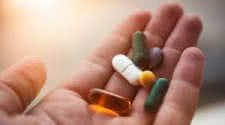Supplement to Lose Weight - These Supplements Help Cut to the Chase

The Addition of Key Supplement can Enhance Fat Loss Efforts
Enhancing the body's natural furnace is generally a painless way to raise your metabolic efficiency. So let's
get stoked!
Regardless of whether or what you eat before you work out, here are a few items that may help you shed some
fat without breaking your bank or pushing your pill count beyond tolerable limits.
Assuming you're serious about dropping fat and doing it relatively quickly, I also suggest adding some aerobics
to your program.
WATER
Although certainly not a supplement, water is the most important of all nutrients. Dehydration (even mild) impairs many aspects of physiology and metabolism, including immune function and overall recovery, so water is the number-one substance to consume prior to training - especially if you train in the morning. We're all slightly dehydrated when we wake up, regardless of whether or not we're dieting. Furthermore, if you sweat a lot during training, your fluid needs are going to be even higher. This situation is compounded by low-carb and high-protein diets.Drink at least one-half liter before hitting the gym and a liter during your workout. Work up to a minimum intake of one fluid ounce per kilogram (2.2 pounds) of bodyweight per day. For example, a 198-pound guy should drink at least 90 fluid ounces (about three quarts or liters) per day. Remember, this is a minimum amount - try to drink a gallon of water a day, in addition to other beverages you may drink. If your morning bodyweight is lower by more than a pound than it was the day before, drink extra water during the hour before and during training.
HMB
One of the few substances that the scientific community recognizes as a bona fide ergogenic aid, HMB (B-hydroxy B-methylbutyrate) is a metabolite of the amino acid leucine; it has anticatabolic properties similar to those of ketones. HMB works most effectively when taken before training, between meals or with a relatively light protein drink or meal replacement powder, but not with solid food. I suggest three to six grams daily, with two to three of those before training.CARNITINE
Although not scientifically proven as an ergogenic aid, my observations over the years have led me to believe that carnitine can be helpful. It has several potential performance-enhancing effects, including transporting fatty acids into the mitochondria (the "powerhouses" of the cell).The minimal effective dose is three grams, and I personally recommend four every day, with or without meals. Take it in powder rather than pill form, if possible. You have to take carnitine consistently for weeks at a time - it won't work if you just take it once in a while or irregularly.
THERMOGENICS
These substances not only stimulate the nervous system, they also cut appetite and promote fat utilization. Ephedrine is the key component of these supplements; synephrine is a milder version that you may want to try. Caffeine adds to the effect of these substances, and even if you choose not to use things like ephedrine, caffeine is well known for its ability to mobilize fat and enhance its use.Various other substances, such as yohimbe, L-tyrosine and aspirin or white willow bark, are often combined with thermogenics. If you take thermogenics, you have your choice of pills, powders or ready-made drinks with or without additional protein and carbs. Follow dosing recommendations of manufacturers and calibrate from there until you determine what works best for you.
Thermogenics aren't right for everyone. Obviously, if you have a heart condition or high blood pressure, stay away from them. If you have concerns or questions, consult your doctor.
PYRUVATE
Although the scientific jury remains out on pyruvate, it does seem to have a modest effect on fat-burning. It should also help spare protein breakdown. The suggested amount is three to five grams (g) before training, and there may be additional benefits from consuming another eight to 15 g throughout the day.VITAMINS / MINERALS / ANTIOXIDANTS
Before training is not the ideal time to consume a dozen pills and several grams of powders, but it's important that you get adequate amounts of minerals and antioxidants on a consistent basis. Properly hydrated and nourished bodybuilders will rarely, if ever, have to worry about their training being impaired by deficiency or loss of electrolytes. However, some key elements are important for myriad metabolic and neuromuscular functions.Magnesium, for example, is deficient in many hard-training athletes. It's a factor in virtually all energy-producing enzymes in the mitochondria and also improves the mental aspect of a workout by keeping anxiety at bay. Antioxidants must be taken consistently to develop appropriate levels of them in tissues. Don't just take them before working out. However, vitamin C and alpha-lipoic acid (ALA) can be effective when taken immediately before facing a stressful situation, such as weight training. Recommended doses are 1,000-3,000 milligrams (mg) of C and 200-500 mg C ALA.
Last but not least in this category is coenzyme Q10 (CoQ10). Without enough CoQ10, there's no stimulus to burn more fat. It's not a superstar in some research, but one study of carnitine, CoQ10 and magnesium did conclude that an ergogenic effect was produced. It takes awhile to absorb CoQ10, and it probably does not work well in the short term; however, with regular use and at a dose of about 100 mg per day, CoQ10 can help you reap benefits in future workouts.
In upcoming articles of fitFLEX, we'll have plenty more to say about thermogenics and other fat-burning supplements. This is an evolving area of research and, with government regulators getting into the fray, bodybuilders need to be informed about what's happening.